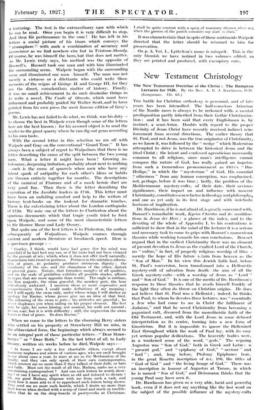Selected Letters of Horace Walpole
Selected Letters of Horace Walpole. Edited by W. S. Lewis. 2 vols. (Oxford University Press. 45s.)
IT has _often been said that to read the letters of Horace .Walpole is like reading a novel.. The saying has stood the test of time because it is true. Mr. Lewis, the editor of this new selection of the letters,' may be said to have given us a compression or synopsis of the whole novel, ,for the letters chosen cover Walpole's life from his nineteenth year to his eightieth. , Only, about a. hundred and fifty letters are here taken from more than 3,500 that have been -published. But they are all chosen with a. fixed purpose and a sound judgment to illustrate the greatest moments in Walpole's life, to recall well-known people, and illustrate Walpole's own character. The owner and conductor of the Strawberry Hill printing press would have been enchanted with the appearance of those two volumes, excellent alike in typography, plates and paper.
Macaulay, as even his most grateful admirers must admit, sometimes lost all sense of proportion when his antitheses ran away with him: One of the most glaring of his failures Is the essay on Horace Walpole. One might think from it that it was a crime to. be a letter-writer of genius when one might give up letter-writing in fiwoiir of pounding away in the House of Commons at those Whig reforms which were still waiting to be enacted—with the help of judicious corruption ; an outrage to be a collector of prints and brae and an authority on founts of type when events were
already moving fast towards the consummation of the French Revolution. As well might one blackguard Jane Austin for being more concerned with assemblies and tea parties than with the 'monstrous shadow. thrown across our island by Napoleon Buonoparte.
In a general way the fact that a man was a Whig WOi enough to mollify the judgments of Macaulay, but in this ce the Whig, who was the son of a Whig, Was condemned out Of hand. To Macaulay ;Walpole's writing' was a kind of pie .de foie grits; the piquant taste was only. the outcome of a diseased state. It was so affected, he thought, that thy affectation had become a second nature. As for, the man biinSelf, he was a snob, so insincere that he would not cowed -with his natural congeners, men of letters and artists, and 93 hypocritical that though he deprecated a love of fame he kept a fair copy (with annotations) for publication of almost every letter he ever wrote. And then Macaulay, shooting tins incomparable and rare butterfly with a blunderbuss, says that Walpole was "destitute of every charm which is derived fro elevation and from tenderness of sentiment."
The truth is that even if genius were not enough—whieli is commonly allowed to be—Walpole had some great qualitieg; the courage of his opinions, loyalty to his friends, consideration. True, he was a little feline and the claw was never far behind the velvet. But if he was ashamed, as a man of fashion, 01 literary connexions, why Gray or Ashton or Hannah More 1 His so-called affectation was indeed a twisting, but it was nevel a torttaing. The -testris the extraordinary ease with-which he can be read., Once you begin it_ is very difficult to stop.
And tit, JOS perfOrmanee"in the :sum ! •He - has . left in his letters a social picture of his times, which conveys. the " atntosphereP--:with. such a combination of accuracy and insouciance as we find nowhere -else but in Tristrant Shandy. Of course; he was-himself the hero ,.hut that does not matter. As Mr. Lewis: troy says, his method- was the opposite- of Boswell's. -Roswell: took one man and with him illuminated the surrounding.seene. . Walpole began with the surrounding scene and illuminated one man—himself. The man was not merely a virtuoso or a dilettante. who could write those memoirs of the reign's of .Getirge.-II -Mid-George III, for they are the direct, cotiselentiolis niatter Of history. Finally, it was no small achievement to do such -dissimilar things as to write a novel, The Castle of Otranto, which must have influenced and probably guided Sir Walter Scott, and to have printed from his .own press the most famous edition of Gray's
poems.. . . _ .
Mr. Lewis has not failed to do what, we think, was his duty— to choose the best in Walpole even though sonic of the' letters here are the best 'known ; for his avowed object is to Send the reader to the great quarry where he can dig out gems according
to his own taste.
With the second letter in this selection we arc off with
Walpole and Gray on the conventional " Grand Tour." It has always been a subject of regret to Walpolians that there is no letter describing the cause of the split between the two young men. What a letter it might have been ! Growing in- tolerance, deepening irritation, probably about next to nothing --such is the cause of quarrels when men who ' have any latent spark of antipathy for each other's ideas or habits are thrown entirely together for months. The descriptions of the carnival at Florence and of a mock heroic duel are very good fun. Then there is the letter describing the execution of the Jacobite leaders in 1746. This letter must have been an unfailing comfort and help to the writers of histoey.text-books on the lookout for dramatic touches. There is the entertaining letter about the London earthquake of 1750. We note One of the letters to Chatterton about the
spurious documents which that tragic youth tried to foist upon Walpole, and some of the most characteristic letters to Sir Horace Mann. and Lady Ossory.
But quite one of the best letters is to Pinkerton, the author
,tibsequently of Walpoliana. Walpole courses through uneient and modern literature at breakneck speed-. Here is a specimen passage :— " Cowley, I think, would have had grace (for his mind was t:rtieeful) if he had had any ear, or if his taste had not been vitiated hy the pursuit of wit ; which, when it does not offer itself naturally, degenerates into tinsel or pertness. Pertness is the mistaken affecta- tion of grace, as pedantry produces erroneous dignity ; the lomiliarity of the one, and the clumsiness of the other, distort or prevent, grace. Nature, that furnishes samples of all qualities, and on the scale of gradation exhibits all possible shades, affords in types that are more apposite than words. The eagle is sublime, the lion majestic, the swan graceful, the monkey pert, the bear ridiculously awkward. I mention these as more expressive and comprehensive than I could make definitions of my meaning ; hut I will apply the swan only, under whose wings I will shelter an apology for Racine, whose pieces give me an idea of that bird. lie colouring of the swan is pure ; • his attitudes are graceful ; he never displeases you when sailing on his proper element. His feet may be ugly, his notes hissing, not musical, his walk not natural ; he can soar, but it is With difficulty:' still, the impression the swan leaves is that-of grace. So does Racine."
When we come to the letters to the charming Berry sisters who settled on his property at Strawberry Hill we miss, in the abbreviated form, the beginnings which always seemed to be an integral part of those particular letters—" Dear Straw- berrys " or "Dear Both." In the last letter of all, to Lady Ossory, written six weeks before' he died, Walpole says :— " At home see only a few charitable elders, except about fourscore nephews and nieces of varibus ages; who are each brought to me about once a year, to stare at me as the Methusalem of the . family, and they can only speak of their own contemporaries, Which interest me no more than if they talked of their dolls, or bats and halls. Must not the result of all this, Madam, make me a very entertaining correspondent ? And can such letters be worth show- ing? or can I have any spirit when so old and reduced to dictate ? Oh, my good Madam, dispense with me from such a task, and think how it must add to it to apprehend such letters being shown. -Pray send me no more such laurels, which I desire no more than their leaves when decked with a scrap of tinsel and stuck on twelfth- Cakes that lie on the shop-boards of pastrycooks at Christmas.
I-shall be quite content with a sprig of rosemary thrown after me, when the *arson of,the parish commits my dust .4i dust-"
ft was characteristic that in:spite of those sentiments IValpole directed that the letter -should be returned to hint for preservation.
. On p. 3, Vol. I., Lyttelton's name is misspelt. This is the only blemish we have noticed in two volumes edited, its they are printed and produced, with exemplary care.



























































 Previous page
Previous page